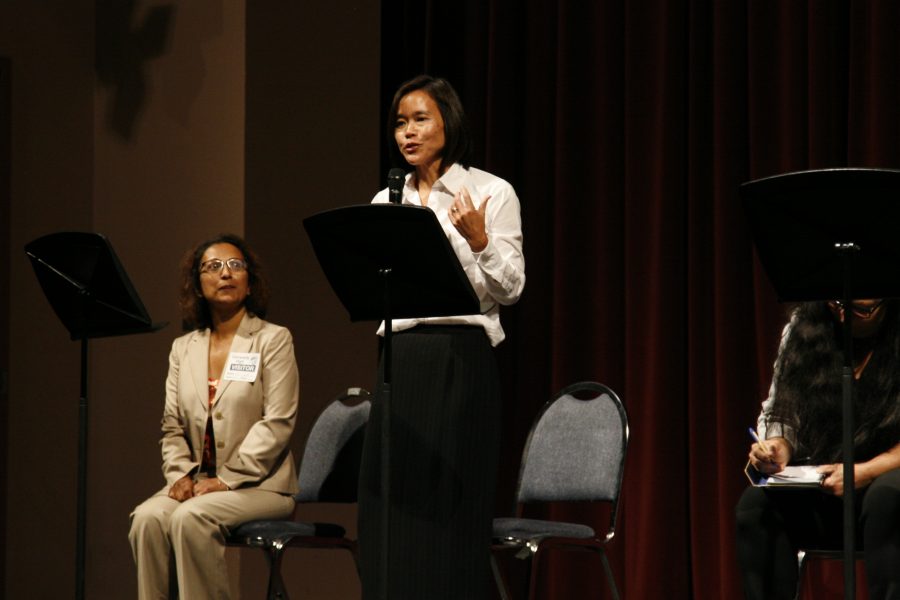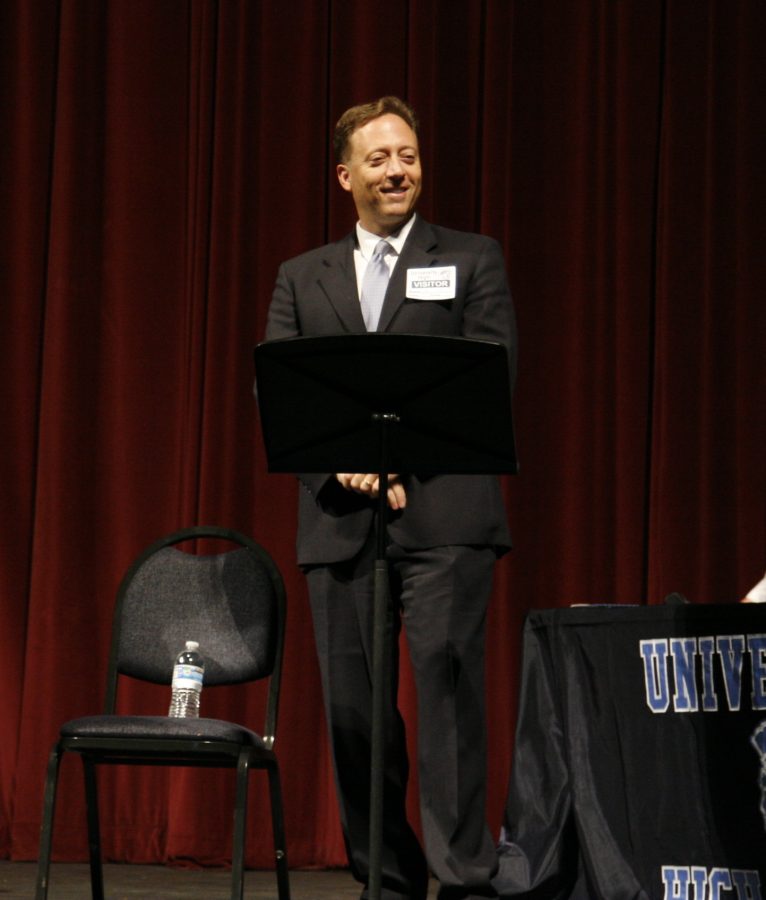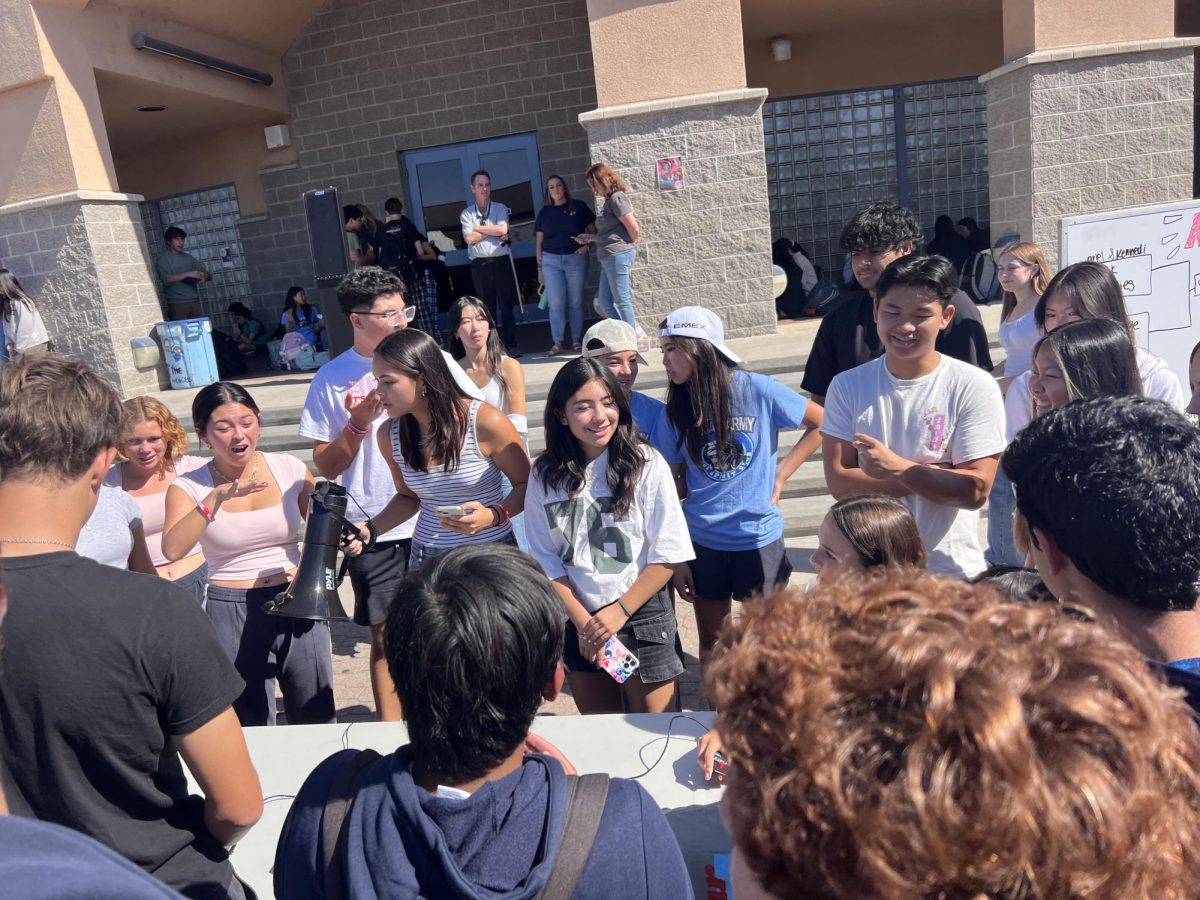Paul Bokota, an IUSD Governing Board Member, begins his opening statement. (Victoria Yu)
By JAYNE CHUNG
Staff Writer
Candidates running for the three open seats on the Irvine School Board answered questions submitted by both faculty and the student body in University High School’s (UHS) first School Board Candidates Forum. Over fifty questions were submitted and six were selected and asked during the Forum, pertaining to the topics of Facilities for the Future, Balanced Education, and Pressures Exerted by Growth. Associated Student Body (ASB) Student Representative Aidan Arasasingham (Sr.) organized and moderated the Forum.
The forum began with a two minute opening statement by each candidate: IUSD Governing Board Member and current Board President Paul Bokota; IUSD Governing Board Member Lauren Brooks; Irvine parent Geri Zollinger; Irvine parent and businesswoman Betty Carroll; and Irvine parent and businesswoman Naz Hamid. One other candidate running for the position, Army Captain and parent Mark Newgent, was unable to attend.
The first question, submitted by Michael Wu (Jr.) expressed concern over aging buildings, such as bathrooms and classrooms, in older IUSD schools and asked the candidates about their plans to revitalize such facilities.
Hamid, the first speaker, pointed to Measure E, an approved bond issue measure which allotted three hundred and nineteen million dollars to improvement of older schools, as a solution in progress.
Zollinger and Brooks echoed the benefits of Measure E and mentioned another initiative, Proposition 51, which supports an increase in state funding towards schools, that would greatly aid renovation of older facilities.
The final speaker, Bokota, elaborated on and promoted the District’s facilities master plan, in which funds are provided to schools after each school’s needs are reported to the district by the administration, in the hopes of creating more equal schools.
Bokota answered the second question, which was posed by Ms. Genevieve Oakes (Social Science Dept.) and Ava Soltani (Sr.) and concerned class sizes, by first stating that, though reducing class sizes was expensive and difficult, instructional aides and other forms of learning were available in the meantime to reduce the instructor to student ratio while extra facilities were considered.
The other candidates agreed that reduction of class sizes was complicated but extremely relevant, and Carroll added that corporate partnerships, may be a possible solution.
Hamid advanced the possibilities of online learning or more blended learning models that could alleviate the problem from classrooms.
The third topic, support for greater funding of arts programs, drew mixed responses. Zollinger and Brooks expressed great pride for current arts programs and the talents and efforts of students in them and suggested that money from grants and IPSF could suffice to continue the success of arts programs.
Carroll again posed corporate partnerships as a source of aide and advocated lobbying for more funding from legislators. “The more you push and push, the more you’re going to get,” she said.
However, Bokota conveyed the hardships of acquiring new funding.
“Part of what we need to do is maintain these relationships… and look at new technologies to teach art to keep art a priority for all students,” Bokota said. Though he said that the Board was already lobbying the government, he presented partnerships with the Irvine Company, IPSF, and as more valuable relationships.
Common Core, the fourth topic, was largely supported by all candidates due to its emphasis on conceptual knowledge.
Bokota stated that not only did Irvine schools already base their curriculum around such ideals but that Common Core was a state standard and could not be changed at the district’s discretion.
“I don’t think [Common Core] has to be sealing and I think it could be improved a lot in other ways,” Zollinger said.
Hamid, who experienced similar standards during her time in school, said the standards encouraged students to “stick with it” for the advantageous effect Common Core would have on their way of thinking and responses to change as a whole.
The fifth question, posed by Neha Krishnam (Sr.), asked the candidates about their plans to lessen the burden on counselors.
Hamid suggested teachers as a source of confidentiality and relief for students, while Brooks recommended the ASB and teacher advisors as people who could relieve the strain and prompted student input for a solution.
“This is something that you guys take on and give us a suggestion for,” she said.
Carroll emphasized not only counseling but mental health as a crucial issue that could necessitate greater resources.
Zollinger and Bokota both stated that there were numerous obstacles for increasing the number of counselors, such as funding, and Bokota indicated the institution of mental health counselors in all IUSD schools as a way to reduce the pressure on counselors.
The final question, submitted by Clare Jun (Fr.) voiced concern over the strain on schools caused by a growing student body.
“[We need a] combination of managing new growth appropriately through boundaries and new facilities and using the money and resources we have to renovate existing facilities,” Bokota said. Bokota also said the creation of new IUSD high school Portola High and Measure E as solutions to reduce the student body.
Alternatively, Carroll opened the possibility of recycling property rather than creating new buildings to accommodate students, and Brooks suggested that an increasing number of students could be favorable due to the potentials of expansion.
Students eligible to vote can cast their votes for candidates of the School Board on November 8 and on November 7 in the UHS Model Election.







![“The amazing science club, unite[s] to experiment new ways to grow their knowledge” Miles Hexun said.](https://uhsswordandshield.com/wp-content/uploads/2024/11/IMG_5875-e1731965934409-1200x723.jpg)







